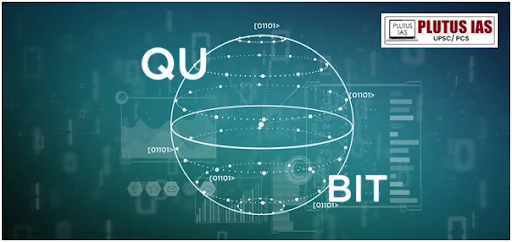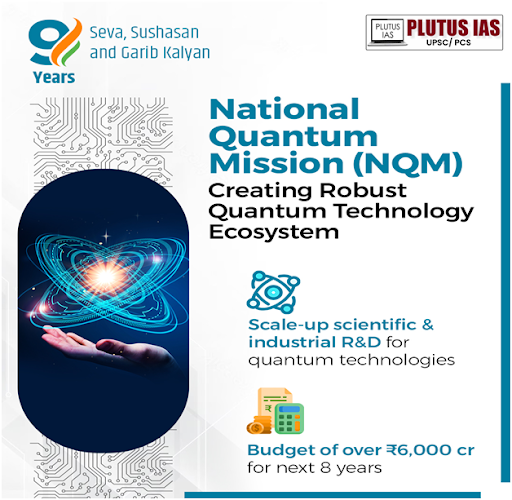30 Aug National Quantum Mission: Pioneering India’s Leap into Quantum Technology
This article covers “Daily Current Affairs” and topic details of the National Quantum Mission.
Syllabus mapping:
GS-3- Science and Technology: Recent development in the field of Computer technology.
For Prelims:
What is the National Quantum Mission; What are cloud computing and quantum computing? Various terms related to it.
For Mains:
What are the features of the National Quantum Computing Mission: its implementation and indigenization of technology in India?
Why in the News?
India is set to unveil its first quantum computer, which will be capable of performing computations with 6 qubits. This development will provide a foundation for further advancements in quantum computing and bolster India’s position in this cutting-edge technology. India has seen the emergence of over 40 Quantum Technology start-ups in the past two years, with some showing global potential. Dr. Jitendra Singh emphasized the importance of these start-ups and highlighted the success of ‘QuNu Labs,’ a Bangalore-based start-up incubated by IIT Madras, which is developing security products based on quantum technologies.

What is Quantum Computing?
Quantum computing is a type of computing that leverages the principles of quantum mechanics to process information in fundamentally different ways compared to classical computing.
Quantum Technology Key Characteristics:
1. Quantum Bits (Qubits): The fundamental unit of quantum information is the qubit. In contrast to classical bits, which can be either 0 or 1, qubits can be in a superposition of states, allowing them to simultaneously represent both 0 and 1.
2. Superposition: A qubit in superposition can perform multiple calculations at once. This allows quantum computers to process a vast amount of possibilities simultaneously, rather than sequentially.
3. Entanglement: Qubits can be entangled, meaning the state of one qubit can depend on the state of another, no matter how far apart they are. This correlation allows quantum computers to solve complex problems more efficiently than classical computers.
4. Quantum Gates: Operations on qubits are performed using quantum gates, which manipulate the probabilities of qubit states. These gates allow for complex operations that are not possible with classical logic gates.
5. Quantum Speedup: Quantum computers can potentially solve certain problems much faster than classical computers by exploring many possible solutions simultaneously. For example, they are expected to be particularly effective at factoring large numbers and simulating quantum systems.

Comparison of Quantum vs Traditional Computing:
| Aspect | Quantum Computing | Traditional Computing |
| Basic Unit | Qubit | Bit |
| State Representation | Superposition: Can represent both 0 and 1 simultaneously | Binary: Can represent only 0 or 1 |
| Processing | Can process multiple possibilities simultaneously | Processes information sequentially |
| Entanglement | Yes, qubits can be entangled, influencing each other | No, bits operate independently |
| Operations | Quantum gates manipulate probabilities of qubit states | Classical gates perform logical operations (AND, OR, NOT) |
| Speedup Potential | Potentially exponential speedup for certain problems | Performance is limited by sequential processing |
| Problem-Solving Approach | Can explore many solutions at once due to superposition | Solves problems one step at a time |
| Complexity Handling | Effective for complex problems like factoring large numbers, quantum simulations | Handles a wide range of tasks but can be slower for certain complex problems |
| Current status | Developing stage | Well established technology |
Applications of the quantum technology in various fields:
1. Cryptography and Cybersecurity: Quantum-resistant encryption will create new security methods immune to quantum attacks, such as lattice-based cryptography. Quantum Key Distribution (QKD) will enable ultra-secure communication, as seen in the use of QKD by the Chinese satellite Micius for secure data transmission.
2. Drug Discovery and Healthcare: Quantum computing will expedite drug development by simulating complex molecules rapidly, like the simulation of protein-folding processes for drug discovery. It will also allow for personalized medicine, exemplified by tailoring cancer treatments based on individual genetic profiles.
3. Optimization and Logistics: Quantum computing will enhance supply chain efficiency by optimizing delivery routes and inventory management, similar to IBM’s Quantum Optimization for logistics problems.
4. Artificial Intelligence and Machine Learning: Quantum computing will develop faster and more accurate machine learning algorithms, such as quantum-enhanced support vector machines. It will improve the training and performance of AI models, exemplified by better neural network training for image recognition.
5. Climate Modeling and Environmental Science: Detailed simulations powered by quantum computing will improve climate change predictions, similar to simulating atmospheric chemical reactions. It will also enhance resource management, such as optimizing energy grid distribution for better conservation.
6. Finance and Economics: Quantum computing will advance financial risk modeling and predictive analytics, like improving risk assessment models for financial markets. It will develop sophisticated algorithms for more effective trading strategies, such as quantum algorithms for high-frequency trading.
7. Quantum Chemistry: Quantum computing will enable precise predictions of complex chemical reactions, such as simulating catalytic processes for better industrial chemical synthesis. It will also advance catalysis research, like developing new catalysts for efficient green chemistry.
8. Fundamental Physics and Research: Quantum computing will help simulate quantum systems, aiding in exploring new physics theories, such as quantum field theory simulations. It will assist in analyzing particle accelerator data, like studying Higgs boson interactions at the Large Hadron Collider.
9. Aerospace and Defense: The technology will enhance the precision of navigation and control systems for spacecraft, such as improving guidance systems for interplanetary missions. It will also develop advanced encryption for secure military communications, exemplified by quantum encryption in defense networks.
10. Telecommunications: Quantum computing will improve the efficiency and reliability of communication networks, such as optimizing network traffic using quantum algorithms. It will also use quantum technology to secure data, as seen in the development of quantum-secured communication networks by companies like ID Quantique.
National Quantum Mission (NQM)

On April 19, 2023, the Union Cabinet, under the leadership of Prime Minister Shri Narendra Modi, sanctioned the National Quantum Mission (NQM) with a total funding of ₹6,003.65 crore for the duration from 2023-24 to 2030-31. This mission aims to foster scientific and industrial R&D in Quantum Technology (QT) and establish India as a global leader in this field.
Mission Objectives:
Quantum Computing Development:
Intermediate-Scale Quantum Computers: Develop quantum computers with 50-1000 physical qubits over the next 8 years.
Technological Platforms: Utilize superconducting and photonic technologies.
Quantum Communication:
Satellite-Based Communication: Establish secure quantum communication between ground stations across 2000 kilometers within India.
International Communication: Facilitate long-distance quantum communications with other countries.
Quantum Key Distribution: Implement inter-city quantum key distribution over 2000 km.
Multi-Node Quantum Networks: Develop networks with quantum memories.
Quantum Sensing and Metrology:
Magnetometers: Create highly sensitive magnetometers for advanced applications.
Atomic Clocks: Develop atomic clocks for precision timing, communications, and navigation.
Quantum Materials and Devices:
Material Development: Design and synthesize quantum materials, including superconductors, novel semiconductor structures, and topological materials.
Device Fabrication: Manufacture quantum devices utilizing these materials.
Photon Sources: Develop single-photon sources/detectors and entangled photon sources for various applications.
Mission Implementation:
Thematic Hubs (T-Hubs): Set up four hubs focusing on Quantum Computing, Quantum Communication, Quantum Sensing & Metrology, and Quantum Materials & Devices. A Call for Pre-Proposals for these hubs was issued on January 20, 2024. The T-Hubs will be established in four key domains: Quantum Computing, Quantum Communication, Quantum Sensing & Metrology, Quantum Materials & Devices
Impact and Benefits:
Global Competitiveness: Position India’s technology development ecosystem at a global level.
Sectoral Benefits: Enhance capabilities in communication, health, finance, energy, drug design, space, banking, and security.
National Priorities: Support key initiatives such as Digital India, Make in India, Skill India, Stand-up India, Start-up India, Self-reliant India, and Sustainable Development Goals (SDGs).
KEY CHALLENGES IN THE IMPLEMENTATION NATIONAL QUANTUM MISSION:
A. Quantum Hardware Development: Scaling quantum computers with many qubits and managing error rates due to decoherence and noise are significant challenges said Dr. John Preskill,
B. Quantum Software and Algorithms: According to The Quantum Software and Algorithms Committee in the USA, developing efficient quantum algorithms and robust software tools is complex and still evolving.
C. Integration with Classical Systems: Ensuring seamless interoperability between quantum and classical systems presents technical difficulties.
D. Funding and Resource Allocation: Securing adequate and sustained funding and managing resources efficiently are critical for long-term success. The National Quantum Mission Oversight Committee points out that consistent financial support is crucial for sustaining research and development efforts.
E. Economic Viability: Balancing the high costs of quantum technology development with economic feasibility is a major concern.
F. Talent and Expertise: The Quantum Workforce Development Panel highlights addressing the global shortage of quantum computing experts and developing effective training programs is essential.
G. Infrastructure and Facilities: Developing and maintaining advanced research facilities for quantum experiments is resource-intensive. The Research Facilities Enhancement Committee notes the importance of investing in state-of-the-art labs and infrastructure.
H. Security and Ethical Considerations: Developing quantum-resistant encryption and addressing ethical concerns around quantum technology use are crucial. Dr. Vanessa Fong, an expert in quantum cryptography, stresses the importance of preparing for the impact of quantum computing on existing security systems and ensuring ethical use.
The potential solution suggested by experts:
1. Increased Funding and Infrastructure Development: The Expert Committee on Quantum Computing, chaired by Dr. Sandeep Joshi, advocates for sustained funding to support long-term quantum research and development. They also emphasize the need for developing and upgrading research facilities to support advanced quantum experiments and technology.
2. Public-Private Partnerships and International Collaboration: The National Quantum Strategy Group, led by Dr. R. Vijayaraghavan, encourages collaboration between public research institutions and private industry to speed up technology development. They also recommend fostering international research collaborations to leverage global expertise and resources.
3. Regulatory Framework and Research Grants: The High-Level Quantum Technology Task Force, chaired by Dr. Abhay Mehta, calls for the development of supportive regulatory frameworks to address ethical and security issues associated with quantum technologies. They also recommend increasing grant availability for fundamental and applied quantum research.
4. Standardization and Talent Retention: The Quantum Technology Advisory Board, led by Dr. Ashok Jhunjhunwala, suggests working on developing standards for quantum technology to facilitate interoperability. They also stress the importance of retaining top talent through competitive salaries and career development opportunities.
5. Interdisciplinary Research and Industry Engagement: The Quantum Technology Research Council, chaired by Dr. Satyajit Mayor, promotes interdisciplinary research to address complex quantum technology challenges and advocates for significant investments in research infrastructure. They also highlight the need for enhanced engagement with industry to transition research innovations into practical applications.
6. Policy Development and Global Positioning: The National Quantum Initiative Working Group, led by Dr. P. K. Iyengar, recommends developing comprehensive national policies to support the quantum technology sector and address potential risks. They also strategize to position India as a global leader in quantum technology and expand educational programs to build a steady pipeline of skilled professionals.
Conclusion:
The National Quantum Mission (NQM) represents a bold and transformative initiative for India, aiming to position the country at the forefront of global quantum technology advancements. Despite the promising potential of quantum computing and related fields, several challenges must be addressed to achieve the mission’s objectives successfully.
Download plutus ias current affairs eng med 30th Aug 2024
PRELIMS QUESTION
Q.With reference to the National Quantum Mission (NQM), Consider the following statement:
1. The NQM was launched to harness the use of cloud computing.
2. The first quantum computer under the NQM is launched by the IIT Delhi.
3. The NQM has the potential to make India a superpower in quantum technology.
How many of the above-given statements are correct?
A. Only one
B. Only two
C. All three
D. None
ANSWER: A
Mains question:
Given the launch of India’s first quantum-based computer as a key milestone for the National Quantum Mission (NQM), what are the primary challenges that need to be addressed to effectively implement the mission and ensure its long-term success?
(250 words 15 marks)



No Comments